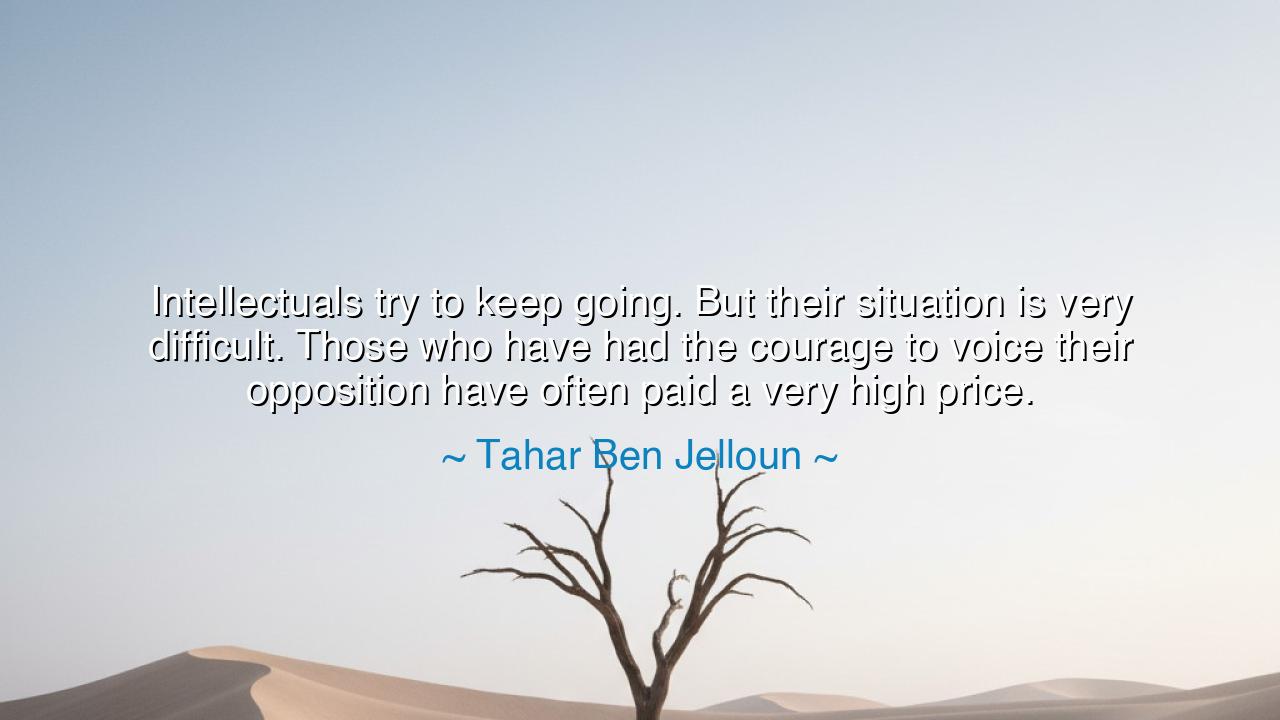
Intellectuals try to keep going. But their situation is very
Intellectuals try to keep going. But their situation is very difficult. Those who have had the courage to voice their opposition have often paid a very high price.






The Moroccan writer and philosopher Tahar Ben Jelloun, whose pen burns with both beauty and defiance, once wrote: “Intellectuals try to keep going. But their situation is very difficult. Those who have had the courage to voice their opposition have often paid a very high price.” In this somber reflection lies the ancient struggle between truth and power, between the voice of conscience and the silence imposed by fear. It is a truth that has echoed through every age: that the intellectual, the thinker, the seer, stands often alone — bearing the weight of truth in a world that resists it. For truth, when spoken in the presence of tyranny, becomes a dangerous thing.
The origin of these words is not abstract; they were born from Ben Jelloun’s experience of his homeland and his era — a time when dissent could lead to exile, imprisonment, or death. As a novelist, poet, and philosopher, he lived between two worlds: the beauty of language and the brutality of politics. His works often explore the struggles of identity, justice, and freedom in societies bound by oppression. When he speaks of intellectuals trying to keep going, he speaks of those who labor in the shadow of censorship and persecution, yet persist — for they know that silence is a greater death than punishment. His words honor those who choose to speak, even when their voices tremble, for the courage to oppose falsehood is the highest act of the mind.
Throughout history, such courage has been both the light and the curse of the intellectual spirit. The philosopher Socrates, who taught the youth of Athens to question everything, paid with his life for his devotion to truth. The poet Osip Mandelstam, who dared to write against Stalin, was sent to perish in a Soviet labor camp. The thinker Hypatia of Alexandria, guardian of ancient wisdom, was torn apart by zealotry. Each of these souls understood what Ben Jelloun meant: that to speak truth in dark times is to walk the edge of a sword. Yet they also knew that silence would be a greater betrayal — not only of themselves, but of the world’s future.
Ben Jelloun’s lament — that “their situation is very difficult” — is not a call to despair, but a recognition of sacrifice. The intellectual’s burden is to hold a mirror to society, to reveal what others refuse to see. In times of corruption, the artist, the writer, the scholar becomes a solitary prophet — condemned by those he seeks to awaken. Yet in this suffering lies dignity. For the truth-teller belongs not to his own age, but to eternity. His voice may be silenced, but his words become seeds — buried in darkness, yet destined to bloom. The tyrants of the past are forgotten; the thinkers they sought to destroy still speak to us today.
One might recall Nelson Mandela, whose mind, though confined behind bars, remained freer than those who imprisoned him. Or Aung San Suu Kyi, who spent years under house arrest for daring to dream of democracy. Their courage was not born of comfort, but of conviction — the certainty that ideas cannot be chained. They, like the thinkers Ben Jelloun honors, teach us that moral strength outlives oppression. For truth, once spoken, becomes immortal; and the one who speaks it, though wounded, becomes a vessel of human progress.
But let us not look only to the famous. There are countless unsung voices — teachers, journalists, students — who have raised their words against injustice, and paid dearly. Some lose careers, others their freedom, still others their lives. Yet their sacrifice sustains the world’s conscience. Every act of courage — every refusal to bow to lies — adds another brick to the temple of truth. It is these quiet martyrs of the intellect that Ben Jelloun calls us to remember, and to emulate. For it is not enough to admire their courage; we must inherit it.
Let the lesson of this quote be carved deep into the hearts of all who seek wisdom: truth demands courage, and courage demands endurance. To think freely is already an act of rebellion. To speak freely is an act of revolution. Therefore, guard your mind against the comfort of ignorance. Read, question, and speak — even when silence would be safer. The world does not change by those who remain quiet, but by those who dare to disturb its slumber.
And so, as Tahar Ben Jelloun teaches, know this: the price of courage is great, but the cost of cowardice is greater still. The thinkers, writers, and dreamers who “try to keep going” are the guardians of civilization’s soul. Support them, defend them, and if you are called to join their ranks, do not falter. For though the path of truth is perilous, it leads to freedom — and freedom, as all ages have learned, is worth every wound.






AAdministratorAdministrator
Welcome, honored guests. Please leave a comment, we will respond soon